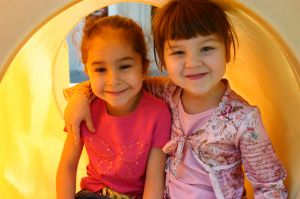Kids Say the Darndest Things: How to Open Up Dialogue
By Guest Blogger Lisa Doss
*Thank you to Forsyth Family Magazine for letting us republish this post on TMoM today!
Young children often appear as mesmerizing dragonflies, flitting and zipping from one topic to the next in rapid succession. Parents, too, after a concentrated effort, may also feel the dizzying effects of the constructive ramblings of a child who says exactly what she thinks. As parents, we listen to the length of each theme, the sentence structure and use of vocabulary, and the tone of voice. Valuable information can be learned if our question is broadened to incite a response greater than one word. Kids truly can say incredible things when inspired to focus on direct, meaningful questions. The future day is around the corner when our child holds back her ideas, or he feels too old to worry his parent about his thoughts. These random and open dialogues will help our child feel that no matter how old they are, they can share everything and anything. Let us agree no longer to ask, “How was your day, today?” instead, there are much broader questions. To help begin the dialogue, you can ask this…
- What are you thinking about? This question certainly opens the door and allows your child to talk freely. In moments when a child is sitting in the car or a room alone without the company of the television, this is a great question to discover your child’s concerns or feelings.
- What was the greatest moment in your day? What a fantastic question for the dinner table! Not only should the youngest at the table answer it, but go around the table, and have everyone contribute. The answer will reveal what everyone in the family values, and, perhaps, spark additional inspirational comments or stories.
- Who did you sit next to at lunch? School is much more than learning. What better time to talk about school than during a time of social interaction and eating? Parents can learn about great moments through situational stories and new and old friends. Most importantly, parents can discover if their child was sitting with friends or choosing to be alone. (Sometimes, parents can indirectly learn the reason for receiving a silent lunch, detention, too!)
- How does your belly feel? Young children, especially, need this question once they claim they are full. Often, their mind is focused on dessert and allowing room for something sweeter. Starting an open conversation about feeling full can lead in the direction of defining good foods, how sugar affects the body, and growth is inspired by eating well.
- What do you like most about your friends? It takes years for a child to see the true value of friendship, and finding the right words to describe the admirable qualities will be challenging. While your daughter or son may enjoy the adventurous friend or the one who always makes the group laugh, they will always value the gift of support, loyalty, honesty, and wisdom.
- How do you think you influence others? Children often do not see themselves as role models or teachers unless they are mindful of their gifts and talents. How children reflect upon their own strengths as well as weaknesses can be life- changing. Once he or she sees themselves as leaders, the role may be difficult; yet, lead to greater achievements.
Books are an additional way to bring families together and talk openly about conflict, problems, or the dynamics between characters. Conversation can flow much easier if the dialogue focuses on fictitious problems which appear unrelated to a child’s life. Enjoy the time together! No matter the response, it is a wonderful moment to openly share thoughts and feelings.

![[Clothes Hanging Storage Organizer] - Our hanging closet organizer comes with 2 sets of weekly labels in different colors, so you can choose according to your preference. There are 6 shelves of open storage space for easy access to clothes. Specially...](https://m.media-amazon.com/images/I/41Bjs3vGEcL._SL160_.jpg)


































